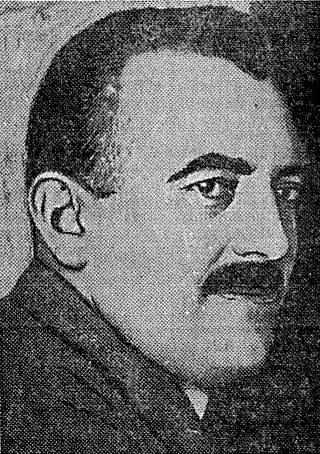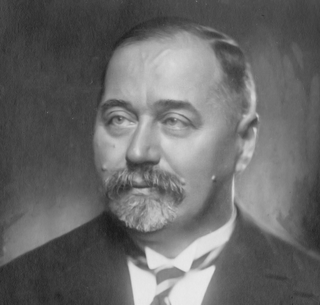
The Kingdom of Yugoslavia was a country in Southeast and Central Europe that existed from 1918 until 1941. From 1918 to 1929, it was officially called the Kingdom of Serbs, Croats, and Slovenes, but the term "Yugoslavia" was its colloquial name due to its origins. The official name of the state was changed to "Kingdom of Yugoslavia" by King Alexander I on 3 October 1929.

The Croatian Peasant Party is an agrarian political party in Croatia founded on 22 December 1904 by Antun and Stjepan Radić as Croatian Peoples' Peasant Party (HPSS). The Brothers Radić believed that the realization of Croatian statehood was possible within Austria-Hungary, but that it had to be reformed as a Monarchy divided into three equal parts – Austria, Hungary and Croatia. After the creation of Kingdom of Yugoslavia in 1918, the Party requested for the Croatian part of the Kingdom to be based on self-determination. This brought them great public support which culminated in 1920 parliamentary election when HPSS won all 58 seats assigned to Croatia.

Puniša Račić was a Serb leader and People's Radical Party (NRS) politician. He assassinated Croatian Peasant Party (HSS) representatives Pavle Radić and Đuro Basariček and mortally wounded HSS leader Stjepan Radić in a shooting which took place on the floor of the Yugoslav parliament on 20 June 1928. He was tried and handed a 60-year sentence, which was immediately reduced to twenty years. He served most of his sentence under house arrest and was killed by the Yugoslav Partisans in October 1944.

Stjepan Radić was a Croat politician and founder of the Croatian People's Peasant Party (HPSS), active in Austria-Hungary and the Kingdom of Serbs, Croats and Slovenes.
The Anti-Fascist Council for the National Liberation of Yugoslavia, commonly abbreviated as the AVNOJ, was a deliberative and legislative body that was established in Bihać, Yugoslavia, in November 1942. It was established by Josip Broz Tito, the leader of the Yugoslav Partisans, an armed resistance movement led by the Communist Party of Yugoslavia to resist the Axis occupation of the country during World War II.

The Corfu Declaration was an agreement between the prime minister of Serbia, Nikola Pašić, and the president of the Yugoslav Committee, Ante Trumbić, concluded on the Greek island of Corfu on 20 July 1917. Its purpose was to establish the method of unifying a future common state of the South Slavs living in Serbia, Montenegro and Austria-Hungary after the First World War. Russia's decision to withdraw diplomatic support for Serbia following the February Revolution, as well as the Yugoslav Committee's sidelining by the trialist reform initiatives launched in Austria-Hungary, motivated both sides to attempt to reach an agreement.
The State of Slovenes, Croats and Serbs became merged with the Kingdom of Serbia and the Kingdom of Montenegro to form the nation of Yugoslavia in 1918. The formation of Yugoslavia began with the formation of the Yugoslav Committee, a collection of mostly Croats, then Serbs and later Slovenes, whose goal was to form a single south Slavic state. In October 1918 the Croatian Parliament declared the Kingdom of Croatia-Slavonia as an independent state, which, in December that same year, incorporated into the State of Slovenes, Croats and Serbs, merged with Kingdom of Serbia and Kingdom of Montenegro and created the Kingdom of Serbs, Croats and Slovenes. The kingdom would be renamed to Yugoslavia in 1929, and ruled by Serbian Karađorđević dynasty till Second World War. After the formation of Yugoslavia, Serbia attempted to create a "Greater Serbia" by using police intimidation and vote rigging to establish a Serbian controlled Yugoslavia. From 1929-1941 Serbian controlled Yugoslavia established control over Croatia through Royal Yugoslav police force brutality and assassinations of important Croatians.

The League of Communists of Yugoslavia, known until 1952 as the Communist Party of Yugoslavia, was the founding and ruling party of SFR Yugoslavia. It was formed in 1919 as the main communist opposition party in the Kingdom of Serbs, Croats and Slovenes and after its initial successes in the elections, it was proscribed by the royal government and was at times harshly and violently suppressed. It remained an illegal underground group until World War II when, after the invasion of Yugoslavia in 1941, the military arm of the party, the Yugoslav Partisans, became embroiled in a bloody civil war and defeated the Axis powers and their local auxiliaries. After the liberation from foreign occupation in 1945, the party consolidated its power and established a one-party state, which existed in that form of government until 1990, a year prior to the start of the Yugoslav Wars and breakup of Yugoslavia.

The State Anti-Fascist Council for the National Liberation of Croatia, commonly abbreviated ZAVNOH, was first convened on 13–14 June 1943 in Otočac and Plitvice as the chief political representative body in World War II Axis-occupied Croatia. It was dominated by the Communist Party of Croatia, a nominally-independent political party active in the territory largely corresponding to present-day Croatia. Despite its nominal independence, the party was a de facto branch of the Josip Broz Tito-led Communist Party of Yugoslavia. ZAVNOH also included representatives or former members of peasant organisations, trade unions, the Croatian Peasant Party, and the Independent Democratic Party.

The Banovina of Croatia or Banate of Croatia was an administrative subdivision (banovina) of the Kingdom of Yugoslavia between 1939 and 1941. It was formed by a merger of Sava and Littoral banovinas into a single autonomous entity, with small parts of the Drina, Zeta, Vrbas and Danube banovinas also included. Its capital was Zagreb and it included most of present-day Croatia along with portions of Bosnia and Herzegovina and Serbia. Its sole Ban during this period was Ivan Šubašić.

The prime minister of Yugoslavia was the head of government of the Yugoslav state, from the creation of the Kingdom of Serbs, Croats and Slovenes in 1918 until the breakup of the Socialist Federal Republic of Yugoslavia in 1992.

Serbian nationalism asserts that Serbs are a nation and promotes the cultural and political unity of Serbs. It is an ethnic nationalism, originally arising in the context of the general rise of nationalism in the Balkans under Ottoman rule, under the influence of Serbian linguist Vuk Stefanović Karadžić and Serbian statesman Ilija Garašanin. Serbian nationalism was an important factor during the Balkan Wars which contributed to the decline of the Ottoman Empire, during and after World War I when it contributed to the dissolution of the Austro-Hungarian Empire, and again during the breakup of Yugoslavia and the Yugoslav Wars of the 1990s.
The Cvetković–Maček Agreement, also known simply as the Sporazum in English-language histories, was a political compromise on internal divisions in the Kingdom of Yugoslavia. It was settled on August 26, 1939, by Yugoslav prime minister Dragiša Cvetković and by Vladko Maček The agreement established the Banovina of Croatia, with boundaries drawn to include as many ethnic Croats as possible. This effectively created within unitary Yugoslavia an autonomous Croatian sub-state, a demand of Croat politicians since the 1918 founding of the Kingdom of Serbs, Croats and Slovenes (Yugoslavia). The Banovina later provided a model for eventual post-war constitutional arrangements in Federal Yugoslavia (1943–1945).
The People's Radical Party was a populist political party in Serbia and later Yugoslavia. Led by Nikola Pašić for most of its existence, its ideological profile has significantly changed throughout its history, shifting from socialism and radicalism towards conservatism in the early 20th century.

The Parliament of Yugoslavia was the legislature of Yugoslavia. Before World War II in the Kingdom of Yugoslavia it was known as the National Assembly, while in the Socialist Federal Republic of Yugoslavia the name was changed to Federal Assembly. It functioned from 1920 to 1992 and resided in the building of the House of the National Assembly which subsequently served as the seat of the Parliament of Serbia and Montenegro and since 2006 hosts the National Assembly of Serbia. The Federal Assembly was the highest organ of state power and the only branch of government in the country, with all state organs subservient to it under the principle of unified power as it was a one-party state, with the League of Communists of Yugoslavia as the sole legal party in the country. Most of the Federal Assembly's actions simply rubber stamp the party's decisions.
The Temporary National Representation, also the Interim National Legislation, and Interim National Parliament, was the first legislative body established in the Kingdom of Serbs, Croats and Slovenes. It was created by the decree of Prince Regent Alexander on 24 February 1919, and convened on 1 March. Its 294 members were generally appointed by various provincial and regional assemblies or commissions. The main product of its work was the act regulating the upcoming election of the Constitutional Assembly. The Temporary National Representation's work ceased after the election held on 28 November.

Yugoslavism, Yugoslavdom, or Yugoslav nationalism is an ideology supporting the notion that the South Slavs, namely the Bosniaks, Croats, Macedonians, Montenegrins, Serbs and Slovenes, but also Bulgarians, belong to a single Yugoslav nation separated by diverging historical circumstances, forms of speech, and religious divides. During the interwar period, Yugoslavism became predominant in, and then the official ideology of the Kingdom of Yugoslavia. There were two major forms of Yugoslavism in the period: the regime favoured integral Yugoslavism promoting unitarism, centralisation, and unification of the country's ethnic groups into a single Yugoslav nation, by coercion if necessary. The approach was also applied to languages spoken in the Kingdom. The main alternative was federalist Yugoslavism which advocated the autonomy of the historical lands in the form of a federation and gradual unification without outside pressure. Both agreed on the concept of National Oneness developed as an expression of the strategic alliance of South Slavs in Austria-Hungary in the early 20th century. The concept was meant as a notion that the South Slavs belong to a single "race", were of "one blood", and had shared language. It was considered neutral regarding the choice of centralism or federalism.

The May Declaration was a manifesto of political demands for unification of South Slav-inhabited territories within Austria-Hungary put forward to the Imperial Council in Vienna on 30 May 1917. It was authored by Anton Korošec, the leader of the Slovene People's Party. The document was signed by Korošec and thirty-two other council delegates representing South-Slavic lands within the Cisleithanian part of the dual monarchy – the Slovene Lands, the Dalmatia, Istria, and the Condominium of Bosnia and Herzegovina. The delegates who signed the declaration were known as the Yugoslav Club.

The Geneva Declaration, Geneva Agreement, or Geneva Pact was a statement of political agreement on the provisional political system in the future union of the South Slavs living in the territories of the former Austro-Hungarian Empire and Kingdom of Serbia. It was agreed by Serbian Prime Minister Nikola Pašić on behalf of Serbia, representatives of Serbian parliamentary opposition, representatives of the National Council of the State of Slovenes, Croats and Serbs which recently seceded from Austria-Hungary, and representatives of the Yugoslav Committee. The talks held in Geneva, Switzerland on 6–9 November 1918 built upon and were intended to supersede the 1917 Corfu Declaration agreed by Pašić and Yugoslav Committee president Ante Trumbić. The basis for the talks was provided by the Greek Prime Minister Eleftherios Venizelos on behalf of the Supreme War Council of the Triple Entente. The talks were necessary in the process of creation of Yugoslavia as a means to demonstrate to the Entente powers that various governments and interests groups could cooperate on the project to establish a viable state.














